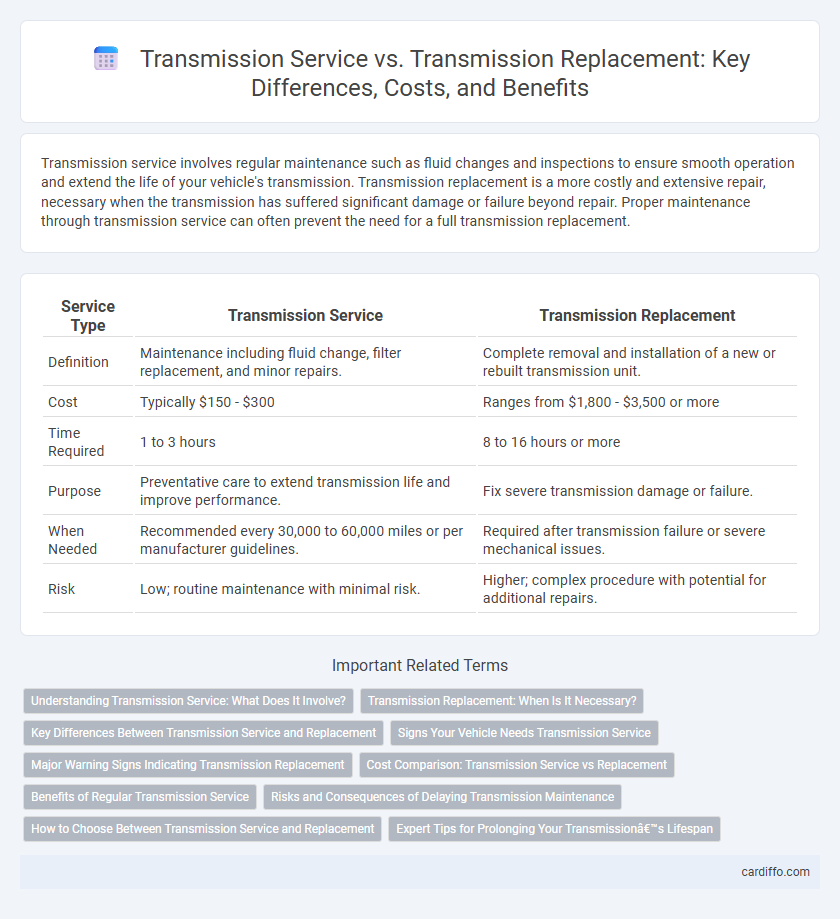Transmission service involves regular maintenance such as fluid changes and inspections to ensure smooth operation and extend the life of your vehicle's transmission. Transmission replacement is a more costly and extensive repair, necessary when the transmission has suffered significant damage or failure beyond repair. Proper maintenance through transmission service can often prevent the need for a full transmission replacement.
Table of Comparison
| Service Type | Transmission Service | Transmission Replacement |
|---|---|---|
| Definition | Maintenance including fluid change, filter replacement, and minor repairs. | Complete removal and installation of a new or rebuilt transmission unit. |
| Cost | Typically $150 - $300 | Ranges from $1,800 - $3,500 or more |
| Time Required | 1 to 3 hours | 8 to 16 hours or more |
| Purpose | Preventative care to extend transmission life and improve performance. | Fix severe transmission damage or failure. |
| When Needed | Recommended every 30,000 to 60,000 miles or per manufacturer guidelines. | Required after transmission failure or severe mechanical issues. |
| Risk | Low; routine maintenance with minimal risk. | Higher; complex procedure with potential for additional repairs. |
Understanding Transmission Service: What Does It Involve?
Transmission service involves routine maintenance procedures such as fluid changes, filter replacements, and system inspections to ensure optimal performance and longevity. This service helps detect early signs of wear or damage, preventing costly repairs by maintaining proper transmission fluid levels and cleanliness. Understanding transmission service allows vehicle owners to extend the life of their transmission and avoid the need for a full transmission replacement.
Transmission Replacement: When Is It Necessary?
Transmission replacement becomes necessary when extensive damage occurs to critical components such as the torque converter, valve body, or gears, making repairs ineffective or too costly. Symptoms like severe slipping, grinding noises, or complete loss of power transfer indicate that the transmission is beyond repair and requires replacement. Opting for transmission replacement ensures vehicle reliability and prevents further damage to the drivetrain system.
Key Differences Between Transmission Service and Replacement
Transmission service involves routine maintenance tasks such as fluid changes, filter replacements, and inspections to ensure optimal performance and extend the lifespan of the transmission system. Transmission replacement entails removing the entire transmission unit and installing a new or remanufactured one, typically required when severe damage or failure occurs. Key differences include cost, with transmission service being significantly less expensive, and scope, as service addresses wear and minor issues while replacement resolves major mechanical failures.
Signs Your Vehicle Needs Transmission Service
Signs your vehicle needs transmission service include delayed or rough shifting, unusual noises such as grinding or whining, and transmission fluid leaks. Warning lights like the check engine or transmission temperature light may also indicate transmission issues. Addressing these symptoms early can prevent costly transmission replacement and extend the life of your vehicle's transmission system.
Major Warning Signs Indicating Transmission Replacement
Major warning signs indicating transmission replacement include persistent slipping gears, unusual grinding noises, and delayed or harsh shifting, which signal severe transmission damage. Fluid leaks, burnt or discolored transmission fluid, and frequent overheating are critical indicators that service alone may not suffice. Addressing these issues promptly with transmission replacement prevents further drivetrain damage and costly repairs.
Cost Comparison: Transmission Service vs Replacement
Transmission service typically costs between $150 and $300, covering fluid changes and minor repairs that extend transmission life and improve performance. Transmission replacement can range from $2,500 to $4,000 or more, involving full removal and installation of a new or rebuilt transmission. Choosing transmission service over replacement can save thousands, making it a cost-effective option for addressing minor transmission issues before they escalate.
Benefits of Regular Transmission Service
Regular transmission service improves vehicle performance and extends the lifespan of the transmission by preventing wear and tear through timely fluid changes and inspections. Maintaining transmission fluid quality reduces the risk of costly transmission replacement and major repairs, saving significant expenses in the long term. Consistent servicing ensures smoother gear shifts, enhances fuel efficiency, and protects the vehicle's overall drivetrain health.
Risks and Consequences of Delaying Transmission Maintenance
Delaying transmission maintenance increases the risk of severe damage leading to costly transmission replacement, as worn fluid and neglected components accelerate wear and overheating. Ignoring minor transmission issues can result in complete transmission failure, causing vehicle breakdowns and unsafe driving conditions. Timely transmission service prolongs vehicle lifespan, prevents expensive repairs, and maintains optimal performance and fuel efficiency.
How to Choose Between Transmission Service and Replacement
Assess the vehicle's mileage and symptoms such as slipping gears, delayed engagement, or unusual noises to determine if a transmission service or replacement is needed. Transmission service, including fluid changes and minor repairs, suits vehicles with moderate wear and maintenance history, while severe damage, metal debris in the fluid, or recurring issues often require a full transmission replacement. Consulting a certified mechanic for a thorough diagnostic is essential to choose the most cost-effective and reliable option.
Expert Tips for Prolonging Your Transmission’s Lifespan
Regular transmission service, including fluid changes and inspections every 30,000 to 60,000 miles, significantly extends the life of your vehicle's transmission by preventing wear and overheating. Expert technicians recommend addressing minor leaks or unusual noises promptly to avoid costly transmission replacement, which often arises from neglect or severe internal damage. Consistent maintenance paired with gentle driving habits helps maximize transmission durability and delays the need for full transmission replacement.
Transmission Service vs Transmission Replacement Infographic

 cardiffo.com
cardiffo.com